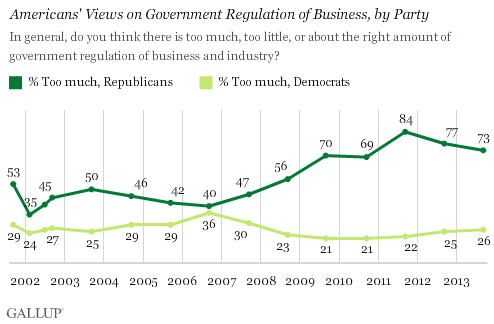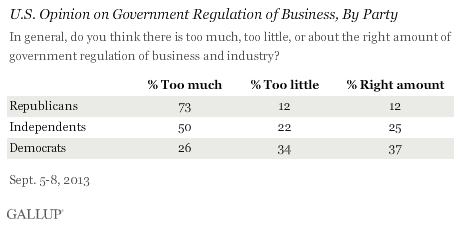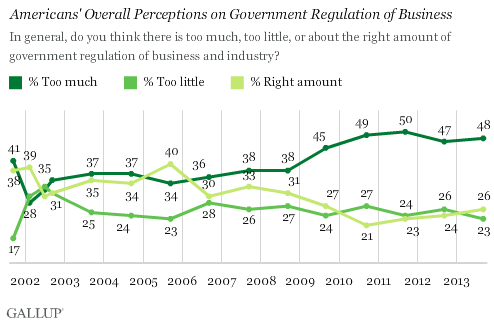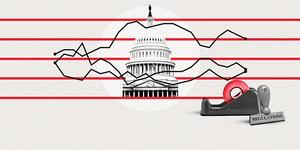WASHINGTON, D.C. -- The gulf between Republicans' and Democrats' views of government regulation of business has widened dramatically since 2007. Currently, almost three-quarters of Republicans say there is too much regulation, compared with one-quarter of Democrats.

Republicans have historically been more likely than Democrats to report there is too much government regulation of business and industry. The gap narrowed to four points in 2006, when a high of 36% of Democrats said there was too much regulation. It has widened since then, particularly after Obama's 2009 inauguration, mostly due to the surge in Republican views that there is too much regulation. Democrats' views have changed little since Obama became president.
While a sizable gap remains between Republicans and Democrats as to whether there is too much government regulation of business and industry, the divide narrowed slightly to 47 points this year from its peak of 62 points in 2011.
Republicans Much More Likely to Say Too Much Regulation; Democrats Split
Although nearly three in four Republicans (73%) say there is too much government regulation of business and industry, Democrats and independents are more divided in their views. Twenty-six percent of Democrats believe there is too much government regulation, 34% believe there is too little, and 37% think there is the right amount. Independents mirror the national averages in their views of whether there is too much (50%), too little (22%), or the right amount (25%) of government regulation.

Americans' Views Overall on Government Regulation Have Remained Consistent
Almost half (48%) of all Americans say there is too much regulation, 26% say there is the right amount, and 23% believe there is too little. Overall, Americans' views of government regulation have not changed much since 2009, when Obama became president. Despite the financial collapse of investment bank Lehman Brothers in 2008, when federal regulators were criticized for failing to effectively regulate the financial firm, at least 45% of Americans in the past four years have said there is too much regulation. This sentiment reached 50%, an all-time high, two years ago.
The percentage of Americans who believe there is the right amount of government regulation has fluctuated in the last decade, but the current 26% is still significantly lower than the peak of 40% in 2005.

Bottom Line
After the financial crisis, some believed that Americans would embrace government regulation of business and industry, especially of the financial markets. While this may be the case as it applies to that specific industry, it does not appear to be the situation when Americans are asked about government regulation of business more generally. If anything, Americans have become more wary of regulation since Obama took office -- although the sentiment among Republicans, while still high, is showing signs of waning.
Survey Methods
Results for this Gallup poll are based on telephone interviews conducted Sept. 5-8, 2013, with a random sample of 1,510 adults, aged 18 and older, living in all 50 U.S. states and the District of Columbia.
For results based on the total sample of national adults, one can say with 95% confidence that the margin of sampling error is ±3 percentage points.
Interviews are conducted with respondents on landline telephones and cellular phones, with interviews conducted in Spanish for respondents who are primarily Spanish-speaking. Each sample of national adults includes a minimum quota of 50% cellphone respondents and 50% landline respondents, with additional minimum quotas by region. Landline and cell telephone numbers are selected using random-digit-dial methods. Landline respondents are chosen at random within each household on the basis of which member had the most recent birthday.
Samples are weighted to correct for unequal selection probability, nonresponse, and double coverage of landline and cell users in the two sampling frames. They are also weighted to match the national demographics of gender, age, race, Hispanic ethnicity, education, region, population density, and phone status (cellphone only/landline only/both, and cellphone mostly). Demographic weighting targets are based on the March 2012 Current Population Survey figures for the aged 18 and older U.S. population. Phone status targets are based on the July-December 2011 National Health Interview Survey. Population density targets are based on the 2010 census. All reported margins of sampling error include the computed design effects for weighting.
In addition to sampling error, question wording and practical difficulties in conducting surveys can introduce error or bias into the findings of public opinion polls.
View methodology, full question results, and trend data.
For more details on Gallup's polling methodology, visit www.gallup.com.
